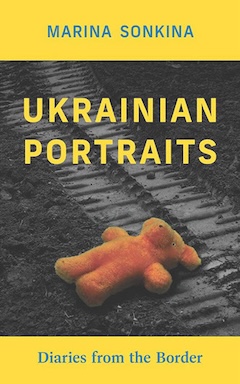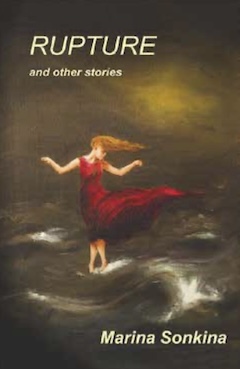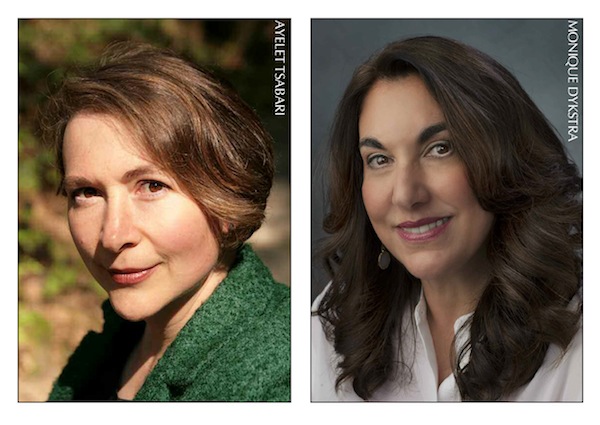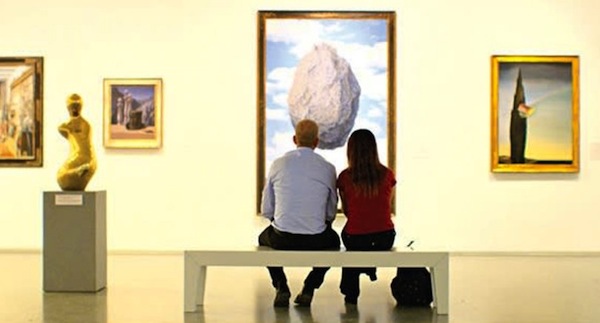Red Shoes for Rachel: Three Novellas, and its author, Boris Sandler. (photo from Syracuse University Press)
When I read and valued the unique style and flavour of Boris Sandler’s story “Studies in Solfege,” in Ezra Glinter’s anthology of short stories, Have I Got a Story for You, gathered from the Yiddish Forward, I wondered if there were any other fictions available in English by this talented, inventive writer. It was heartening and encouraging to see that, in the parentheses where age is given, there was no other number besides his year of birth. To my delight, I soon learned that Syracuse University Press was planning to issue Red Shoes for Rachel.
In talking about Yiddish writers, we usually are dealing with those long gone, like Sholem Aleichem, I.L. Peretz, Avraham Reisen or Chaim Grade – it is a distinct pleasure to review a book by a living Yiddish writer.
In Red Shoes for Rachel, we meet Sandler’s fellow Jews from Bessarabia. During the Second World War, the Jews there suffered under the Germans and the pro-German Romanian fascists. But then, soon after being liberated by the Red Army, they fell under the rule of rigorous Soviet dictatorship. In these three novellas, we meet perceptively drawn men, women and children as they live their bumpy lives and dream their hopes in the Soviet Union, in Israel and in the goldeneh medineh (golden land), Brooklyn, more specifically, Brighton Beach.
Sandler’s style, unlike that of most other writers in the Yiddish literary canon – almost all of whom write in the late 19th-, early-20th-century realistic style – hovers between realism and magic realism (think of writers like Jorge Luis Borges, Italo Calvino and Mario Vargas Llosa) with surprising effect. Time zones elide. Scenes shift, via recall, from years past to the present. Arching over this are believable, vibrant human beings who are vivified through description, dialogue and interior monologue.
From the first line of “Karolina-Bugaz” – “Bella woke from sleep as if she had been driven out of it” – one sees at once a writer who uses his tools – words – with verve and imagination. On the 30th anniversary of her marriage, Bella goes to a bakery to pick up a special cake she has ordered. But she comes home to find a note that her husband, Mark, has left her. He is now on a cruise, alone, and, on an island near where the ship has docked, he meets a young woman who has the same name as his wife.
In realism, a reader knows where he is, and which character is breathing in his presence. In magic realism, the borders between true and make believe are blurred and the reader is never really sure. Reality in such fiction is a slippery slope.
In the beginning of “Halfway Down the Road Back to You,” we see an 80-year-old woman in Israel preparing dozens of slices of dried white bread, which are scattered all over her apartment – she considers this an obligatory present when visiting.
The woman had spent 73 of her years in Beltsy, Bessarabia. For the past seven, she has lived in her small apartment in Nazareth, where there is a windowless security room stored with food, “just in case.” Both her children are abroad; there is no indication she has any friends, except for a twice-a-week aide. Via memories, we relive her days in the Romanian ghetto during the Second World War, where she risked being shot by slipping out once in awhile to beg for food for her family. It is only toward the end of the tale that we suspect she might be bringing all those crusts she has prepared into that security room, though we can’t be sure.
Red Shoes for Rachel contains one of the most beautiful and moving stories of middle-aged love I’ve ever read. Rachel, the only American-born protagonist in the collection, lives near the Coney Island boardwalk and selflessly tends to her wheelchair-bound mother. One day, when she bumps into Yasha, a divorced immigrant from Moldavia, her life turns around and achieves a spark. In separate chapters, we learn of Yasha’s Holocaust experiences and also those of Rachel’s parents. With delicacy and warmth, the relationship develops. By the end, the two lonely souls have formed a bond.
Occasionally, in translations of Yiddish literature, there is a wide gap between knowledge of Yiddish and knowledge of Yiddishkeit (Judaism), with errors regarding some obvious points in the latter. One story depicts “a Sabbath lunch with songs and putting on of phylacteries” (tefillin), which is done during morning prayers on weekdays and certainly not during lunch. Another has a mistranslation of the Hebrew/Yiddish exclamation, “Borukh Hashem,” which does not mean, “blessed be His name,” but “blessed be God” or, actually, “thank God.” Elsewhere, a woman “blesses the Sabbath candles.” Jewish women do not bless objects and, in this case, would recite a blessing to God over the candles. These comments aside, Barnet Zumoff’s translation is splendid, natural and effortless. It meets the gold standard of translation – reading this book one assumes the stories in it were written in English.
Read Red Shoes for Rachel and you will discover a superb storyteller, a modern master of prose.
Curt Leviant’s most recent books are the critically acclaimed novels King of Yiddish and Kafka’s Son.
 Join writer Marina Sonkina in celebrating the release of her two new books: Ukrainian Portraits: Diaries from the Border and Rupture and Other Stories. About Ukrainian Portraits, she writes: “At the end of March of 2022, I traveled to the Ukrainian-Polish border to volunteer at a refugee evacuation centre. Much as I tried to prepare myself psychologically, what I encountered face-to-face didn’t fit any of my expectations: I saw a disaster on a massive scale. I went to volunteer as someone who speaks Russian, Ukrainian and other languages; someone who had been a refugee herself.
Join writer Marina Sonkina in celebrating the release of her two new books: Ukrainian Portraits: Diaries from the Border and Rupture and Other Stories. About Ukrainian Portraits, she writes: “At the end of March of 2022, I traveled to the Ukrainian-Polish border to volunteer at a refugee evacuation centre. Much as I tried to prepare myself psychologically, what I encountered face-to-face didn’t fit any of my expectations: I saw a disaster on a massive scale. I went to volunteer as someone who speaks Russian, Ukrainian and other languages; someone who had been a refugee herself. I soon realized that what the Ukrainian refugees needed most (apart from practical advice) was to talk about their experiences. They needed to be heard.”
I soon realized that what the Ukrainian refugees needed most (apart from practical advice) was to talk about their experiences. They needed to be heard.”



